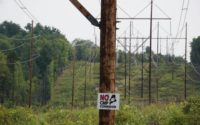Project Dispute
2022 Top 400 Sourcebook: Maine High Court Ruling Could Revive $1B Clean Transmission Project

A Maine high court ruling could revive the controversial $1-billion Central Maine Power hydropower corridor that was blocked last November by a citizen ballot referendum.
The state Supreme Judicial Court decision will reverse the referendum if “substantial construction” on the transmission line had been completed before the vote, judges ruled on Aug. 30.
Related link:
View complete 2022 list, with full market analysis
Subscription Required
The court ruling now sends the Central Maine Power corridor dispute back to lower court to determine whether the corridor project had advanced enough before the referendum for the developer to hold vested rights. It is the high court's first vested rights challenge for a large-scale infrastructure project.
The 145-mile New England Clean Energy Connect project would deliver hydropower from Quebec through western Maine to supply Massachusetts, as part of its clean energy plan.
Until now, the court has only resolved “a vested rights challenge to retroactive changes in local zoning ordinances affecting a project of limited scale,” according to the ruling.
In documents filed with the court, Central Maine Power and its owner Avangrid say they spent $450 million, 43% of the total current project cost estimate by November 2021. The firms cite “substantial physical construction has occurred”—including clearing 124 miles of right-of-way along the corridor, more than 80%, for direct current (DC); completion of clearing for alternating current (AC); installation of 70 structures on the DC part and 54 structures along the AC part; and installation of more than three miles of conductor. The builders also say that “converter station construction is well underway.”
“The initiative represents an extraordinary attempt to deprive a private party of vested rights in the construction and operation of a multi-year development project,” the filing notes.
But opponents of the controversial project hold that developers may have accelerated the project to build the argument for vested rights.
“This is an ongoing argument opponents have had with [the developers] since the beginning and even after the referendum that they were speeding up their timeline to build this argument,” says Adam Cote, an attorney with Drummond Woodsum in Portland, Maine.
Massachusetts remains committed to the project following the Maine high court ruling. “The New England Clean Energy Connect transmission line project is a key component of the Commonwealth’s Net Zero emissions strategy,” says Troy Wall, spokesperson for the Massachusetts Executive Office of Energy and Environmental Affairs. “The ruling … is encouraging.”
Colin Durant, spokesperson for the Natural Resources Council of Maine says the “decision is difficult to interpret,” adding that “It is clear there will be further review of these issues by lower courts, but … unclear when that review will take place or how long it will take.”




